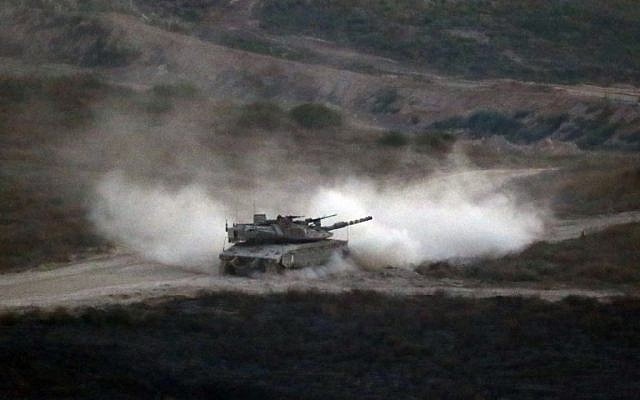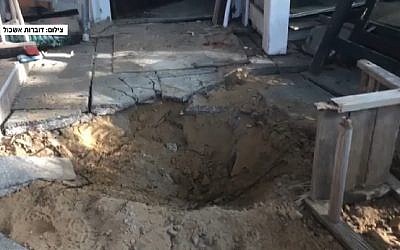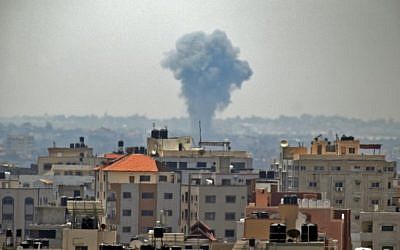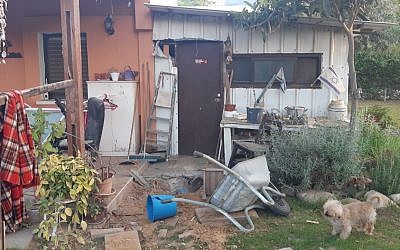Additional forces deployed along border area; high-level security cabinet set to convene on conflict in south

The Home Front Command was lifting restrictions on residents in the Gaza periphery, who were instructed earlier in the day to avoid outdoor activity, as an uneasy calm took hold in southern Israel.
Beginning at 6 p.m. on Wednesday, the army was rolling back its earlier instructions to stay close to bomb shelters, following a nearly 12-hour respite in rocket fire from the Gaza Strip.
The high-level security cabinet was set to hold a meeting on Wednesday at 6 p.m. to review the situation, and repair work began on power lines in southern Israel that supply electricity to the Palestinian enclave and had been damaged by the volley of rocket fire.
Hamas had claimed an Egyptian-brokered ceasefire agreement had been reached with Israel, a claim Jerusalem denied earlier on Wednesday. But a senior Israeli defense official, speaking on condition of anonymity, indicated to reporters that an understanding had been reached under which Israel would not conduct additional strikes in Gaza as long as no more rockets or mortar shells were fired.
The Eshkol Regional Council said earlier on Wednesday that while schools were operating as usual, an increased number of security personnel were deployed in the area and in accordance with Education Ministry instructions, no outside activities were held within 15 kilometers (9.5 miles) from the Gaza border.

Army Radio reported that overnight Tuesday-Wednesday, Israeli Electric Corporation workers began work to repair power lines which were damaged by a Palestinian rocket, cutting of electric supplies to areas in southern Gaza.
The damage to three power lines leading to Gaza was preventing the flow of electricity to the southern areas of the beleaguered coastal enclave, an IEC spokesperson said Tuesday evening, leaving tens of thousands of Gazans with no electricity.
Energy Minister Yuval Steinitz had ordered the company to hold off repair work until the fire ended in the restive border region, so as not to “not endanger its workers.” However, the work began even though rocket fire continued until 5 a.m.
In light of the ongoing tensions with Gaza, the military decided to postpone a planned ceremony for Maj. Gen. Herzl Halevi to take over as head of the IDF Southern Command from Maj. Gen. Eyal Zamir.
The ceremony was due to take place on Sunday, but has been pushed back to Wednesday, the army said. Halevi comes to his new position after serving as head of Military Intelligence. Zamir will end his tenure as head of the Southern Command after nearly three years in the position.

A senior defense official said Wednesday that Israel was prepared to refrain from further attacks on Gaza if terror factions in the Strip also kept the peace, indicating that an informal ceasefire has taken hold after a restive day.
The Hamas terror group, which rules Gaza, deployed forces on the ground and along the border in an effort to maintain quiet and stop any further rocket fire at Israel, Hadashot news reported.

The Israeli Air Force bombed dozens of Hamas and Palestinian Islamic Jihad facilities across the Gaza Strip in two rounds of air raids, on Tuesday afternoon and predawn Wednesday, amid the largest exchange between Israel and Gazan terrorist groups since the 2014 war. The escalation began with a barrage of mortar shells fired into southern Israel by Islamic Jihad on Tuesday morning, one of which landed outside a kindergarten shortly before the children arrived.
Over the course of 22 hours, from 7 a.m. Tuesday to 5:17 a.m. Wednesday, sirens were triggered at least 166 times in southern Israel, according to the IDF Home Front Command, by mortar fire, rockets or, in some cases, heavy machine gun fire.
The military has yet to release a final tally for the number of projectiles fired at southern Israel from Gaza, but it is likely to approach 200.
From the end of the 2014 Gaza war until Tuesday, approximately 80 projectiles were fired from Gaza into Israel, according to Israeli figures.
Dozens of the incoming mortar shells and rockets were intercepted by the Iron Dome missile defense system, which proved relatively successful for the first time against the short-range mortar fire. Others landed in open fields in southern Israel. A small number landed inside Israeli communities, including a mortar round that directly hit a home in the Eshkol region and the shell that exploded in the yard of a kindergarten. Parts of a rocket also struck a sports center in the town of Netivot, causing damage to the facility but no injuries.
As reported by The Times of Israel
